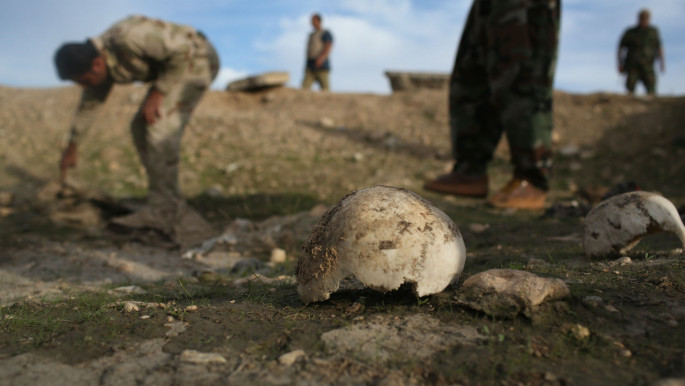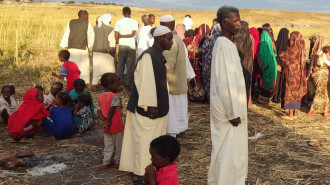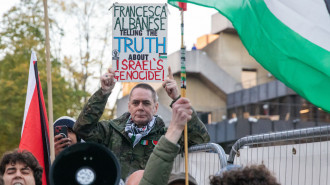Should Canada prioritise resettlement of Yazidis?
Should Canada be doing more to resettle Yazidis under threat from the Islamic State group in parts of Iraq and Syria?
That's the main question being raised in parliamentary committee hearings in Ottawa, as the opposition Conservative party continue to call for Prime Minister Justin Trudeau's government to bring in more members of the persecuted religious minority.
"These people are being wiped off the face of the Earth," said Conservative MP and immigration critic Michelle Rempel.
Rempel, who has spearheaded the recent effort to get Canada to prioritise the resettlement of Yazidis and other religious minorities, said Canada should "lean on" the United Nations to make it happen.
Parliamentarians held three days of hearings under the banner "Immigration Measures for the Protection of Vulnerable Groups," hearing testimonies from a varety of stakeholders, including Yazidis that escaped violence in Iraq, and other community leaders.
"Yazidis are not getting help from anyone," said Nadia Murad, a 22-year-old Yazidi woman from Iraq's Sinjar province who survived sexual slavery at the hands of the Islamic State group.
The Yazidis belong to an ancient ethnic and religion with roots in Mesopotamia.
In August 2014, IS attacked the Sinjar area of northern Iraq, home to tens of thousands of Yazidis, and executed thousands of Yazidi men and boys. The group then enslaved women and girls - and about 3,000 are still believed to be held captive by the group.
"They are currently in the camps of Iraqi Kurdistan; they've lost their mothers, their fathers, their brothers… There is nobody to help them," Murad told the committee in the Canadian capital.
A partisan issue
But the idea of resettling Yazidis has taken a partisan tone in Canada, with Conservative MPs using the issue to try to score political points against the Liberal government.
Meanwhile, CBC recently reported on a recent internal audit that showed that, of 546 refugee files examined while the Conservatives were in power, only three individuals identified as Yazidi.
 |
Canada is well-positioned to provide protection to various vulnerable groups in need of resettlement, including Yazidis |  |
Sonia Lesage, a spokesperson for Citizenship and Immigration Canada, told The New Arab that a visa officer assesses persecution based on religion, and Canada relies on the UN Refugee Agency (UNHCR) and private sponsors to identify refugees needing resettlement.
"As such, Canada is well-positioned to provide protection to various vulnerable groups in need of resettlement, including Yazidis," she wrote in an emailed statement.
Lesage said Canada's government-assisted and private sponsorship resettlement programmes "provide protection to women and girls at risk, as well as members of religious minorities who are refugees", including Yazidis living outside their home country.
 |
|
| Mass graves of Yazidi women killed 'because they were too old for IS fighters to 'marry'' have been found in Sinjar [Getty] |
"Vulnerability is one of the key factors used by the United Nations Refugee Agency in identifying refugees for resettlement to Canada, as was done for the Syrian resettlement initiative," she said, referring to Canada's resettlement of more than 29,000 Syrian refugees since November.
Gloria Nafziger, Amnesty International Canada's refugee, migrants and country campaigner, told The New Arab that without setting objective criteria for resettlement, the process is in danger of "becoming politically motivated".
Canada should rely on UNHCR to refer the most vulnerable populations for resettlement, she said.
"It's almost impossible to separate the politics from the vulnerability, but I think that as a nation we have a responsibility to do that as much as we can," Nafziger said.
"There's absolutely nothing wrong with identifying vulnerable populations and, absolutely, the Yazidis are among those vulnerable populations. But I think, at the end of the day, it's going back to UNHCR and relying on the referrals that come from UNHCR, who have that expertise to do that selection."
She added that though there is nothing wrong with promoting resettlement as a solution, it is the third option for refugees after facilitating local integration and a return to their home country.
"You're going to address much, much greater numbers of people if you can provide safety and security for those people either in their host countries or within the countries that they're trying to flee."
IS 'genocide' against Yazidi
In mid-June, Canadian Foreign Minister Stephane Dion said Canada recognised the crimes committed by IS against the Yazidi community as constituting genocide.
The declaration came after a United Nations report found that IS had committed numerous crimes against humanity and war crimes against the Yazidis.
 |
Given this evidence, our government believes that genocide against the Yazidis is currently ongoing |  |
"[The Islamic State group] has sought to destroy the Yazidis," the report stated, through killings, sexual slavery, torture, inhuman and degrading treatment, forced religious conversions, forced removals of children from their families, and the erasure of Yazidi identity.
"For the first time, an independent report by the UN Commission has concluded that genocide was committed by the so-called Islamic State against the Yazidis. Given this evidence, our government believes that genocide against the Yazidis is currently ongoing," Dion said in parliament shortly after the report was released.
"We call once again for urgent action on the part of the UN Security Council," he said.
Janet Dench, executive director of the Canadian Council for Refugees, told The New Arab that the resettlement of Yazidis was complicated by the fact that many remain in their home country.
In 2011, Canada cancelled the "Source Country Class" refugee category that allowed the government to consider individuals facing persecution in their own country to be considered for resettlement. "We have some concerns around that because it means that there aren't clear criteria," Dench said.
The UN report also "does not mention resettlement as being one of the things that people are recommending," Dench said. "We're not totally sure where it's coming from, the suggestion that this is the best solution for them."
The UN refugee agency estimates that the projected number of refugees in need of resettlement in 2017 will surpass 1.19 million. UNHCR says it will refer 170,000 refugees for resettlement next year based on global resettlement quotas.
But Dench told The New Arab that some individuals had stressed the importance of Yazidis remaining in the Middle East to preserve their ancient community and longstanding ties to the region.
"We need to be cautious about thinking that coming to Canada is always the solution for people," she said.
Setting a quota
Immigration Minister John McCallum told parliament in June that Canada was taking the issue of Yazidi resettlement "very seriously".
"We are welcoming a number of Yazidis into Canada in coming weeks and we will work very hard to do more, not just for Yazidis, but [for] other endangered groups in difficult to reach territories of the world," he said.
But Murad Ismael, executive director of Yazda, a US-based Yazidi advocacy group, told the parliamentary committee that he was "surprised that a country like Canada would not see our tragedy".
He urged the Canadian parliament to pass a formal resolution recognising that genocide had been committed against the Yazidis and set a quota of 5,000-10,000 Yazidis to be resettled in Canada.
"When we say that we don't know what the future will look like for us, we indeed mean it," Ismael said.
The committee is expected to release a report on its findings in September.
Meanwhile, Nafziger at Amnesty International speculated that Canada would be looking into identifying Yazidis for resettlement "because of the political pressures that are being applied right now".
She added that, whatever the outcome, Canada must also commit to a global response to refugee needs.
"I think we need to also look at a balanced, global approach to our refugee resettlement initiatives. If Canada were to single out a population, I would hope they would do that and have that over and above their annual commitment to the resettlement of refugees."
Jillian Kestler D'Amours is a journalist based in Canada. Follow her on Twitter: @jkdamours





 Follow the Middle East's top stories in English at The New Arab on Google News
Follow the Middle East's top stories in English at The New Arab on Google News


